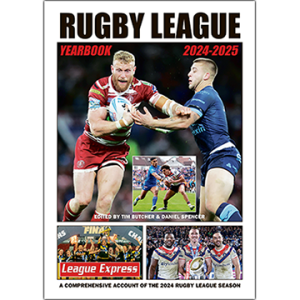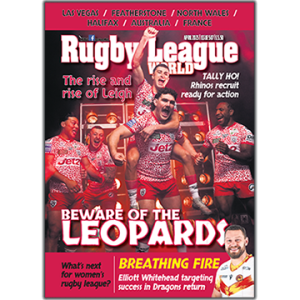
Western France is not noted as a rugby league hotbed, but there is some activity there, and plenty of ambition to grow the sport in future with visits from overseas teams.
SEEN from outside, especially from the piers of the River Seine, the west of France seems to be a reluctant place to welcome rugby of either code.
As I spent a part of my childhood there, I can confirm that this is an area where football rules. The football club FC Nantes, known as the Canaries, may share the same colours with ASC Carcassonne XIII, but they have probably never heard of the Aude’s Treiziste club.
It’s a French paradox as rugby arrived on these shores via the north west of the country, Le Havre. It was brought by the English middle-class communities living in France; merchants and manufacturers.
Conquering the area wasn’t a cakewalk even for French rugby union; but today, about 152 years after the introduction of the code, the FFR XV can brag about the presence of two major clubs; La Rochelle and, more recently, French Brittany’s Vannes, which is presently playing in the much-hyped Top 14 competition. This is probably the result of a national policy of funding; when you are able to offer funds on a national scale, even thin ones, sooner or later, you are bound to get results. Yet, wherever union manages to settle, gaining territory over football, usually with a lot of publicity, it shows that there’s an opportunity for our code to exist, even if it’s only discretely.
But western France isn’t ‘terra incognita’ for French rugby league. I had a few occasions to mention that area in the past; for example, the first time in RLW 463, I mentioned Nantes XIII, a club founded in 1936, still existing, and described it as a ‘lost rugby league colony’ in the middle of a football landscape, underlining the fact that it is still the active centre of a network of rugby league schools. In RLW 496, I reported the difficulties of the western teams, who experience long trips to play their matches, even with their closest Parisian or Normandy based opponents. But in the west, like in the Great Paris or even in some other urban places such as Montpellier, there has been an interrupted tradition of rugby league.
Regardless of the names they wear, the organisational structure they choose, Treizistes always find a way to survive and to rebound.
A perfect example of that is a club located in the southern suburbs of Nantes; Le Rezé XIII. Older Treizistes will remember that there was a club which already existed and disappeared in the 70s. But Le Rezé is back, and if it is new to many of us, this is not recent. The club was recreated in 2011 by two people from Loire-Atlantique (the area of Nantes); Pierre Chauvin and Gilles Cousseau. Their stadium is Le Stade de la Robinière, a ground they share with the local union club.
The club only has 30 FFR XIII registered members but is interesting in many ways. Located in a very urban area described by the trio of managers (Vincent Delorme, Nicolas le Goff, and Gaëlle le Goff) with these words: “we’re based in a city which is adjacent to the city of Nantes, member of the Nantes Métropole, with a mid and rainy climate.”
Nantes Airport, the 9th busiest French airport (to compare Toulouse is 5th, Carcassonne 30th and Perpignan 32nd), is only a stone’s throw from Le Rezé.
They have three sections; of course, rugby league, but also, they practice two forms of the code which belongs to the full range of activities offered by more and more French clubs nowadays; “Fit XIII” (a fitness activity for everyone) and “Silver XIII”, an activity created by François Gary (see RLW 493) based upon the play-the-ball rule, and which is aimed to help the over-60s with balance and stability.
Even if they are located in an area where rugby League is not popular, the “Rezéens” have managed to find sponsors; local companies (Carrefour for instance) and also the city of Le Rezé (which hasn’t replied yet to my questions about the motivations of their commitment for ruby league and preferred to delegate all answers to the Treiziste club).
They are also supported by the regional FFR XIII committee: “We’re fortunate to be backed by the ‘Comité 44’. Their energetic activity led to the organisation of several top events; a training session of the women’s national side in Nantes in 2023, the wheelchair’s State of Origin in 2024, the same year the double header between France and England (at U17 with a double victory for the Chanticleers and an incredible atmosphere thanks to the English supporters), and more recently, the wheelchair game between France and Ireland,” says chairman Vincent Delorme.
That game against Ireland was a little nod to history; Nantes’ area is said to be a Celtic region, some even say that culturally, Nantes belongs to French Brittany. May you’ll think it’s a bit far-fetched, but Ireland, somehow, almost played at home.
But what is interesting in Le Rezé’s point of view on our game is that they are at the forefront of the French rugby league’s reconquest, experiencing the difficulties of many clubs based in big cities.
“As we’re not in a traditional area of rugby league, the public has little knowledge of the code. People keep asking us what the differences between rugby league and rugby union are. We have difficulties in attracting players and to keep them.”
Interviewed by the local newspaper Ouest France last year, President Delorme indeed confessed that their young players turned to union, because of the lack of teams to play.
An episode epitomised that issue last year; a nearby club, Le Vertou XIII switched to union.
“We were saddened by this code-switching. Indeed, it was an historical and well-established club with many registered players in many sections. It seems they had disagreements with the French Rugby League Federation, they complained about the lack of official competitions, and didn’t share the same vision as the local committee about the local growing of the code.”
Despite the loss of Le Vertou, there are still four clubs in the area of Nantes along with le Rezé; Nantes Rugby XIII, of course, who merged with Le Clos Torreau, Noé Lambert Rugby XIII (east of Nantes) and Les Dragons de l’Erde ( north of the city). An U15 selection was even created with players of these clubs, who play in an official competition contested by south western teams such as Cahors, Saint Gaudens, and XIII Gascon (based at Fauguerolles; at the west of Villeneuve-sur-Lot).
So far, the club hasn’t had any contacts abroad, but would appreciate to create connections with foreign clubs.
“Each year, we organise an annual competition called “Le Challenge de l’Atlantique”. This year, it will on 29th March 29. If British clubs want to compete, they are welcome to contact us,” says an enthusiastic Delorme.
“The airport is only 15 minute drive from the stadium!”
The solution of the difficulties encountered by clubs in terms of communication such as Le Rezé may be in this suggestion. Foreign teams touring in France and adding an international flavour to local competitions benefits French RL clubs.
French clubs still won’t be visible from the piers of the Seine River, but at least it can give them more credits (in many ways) to the local authorities who support them, if they acquire some international stature.
The club left this message for RLW readers: “If you are living in Nantes or nearby, or simply passing by, don’t hesitate to come and visit us. We’ll be happy to meet and share with you. Everyone is welcome, there’s room for all. We are always looking for new members and supporters!”
Visit https://reze-rugby13.netlify.app/ or email: rezerugby13@gmail.com for more information.
First published in Rugby League World magazine, Issue 506 (March 2025)




